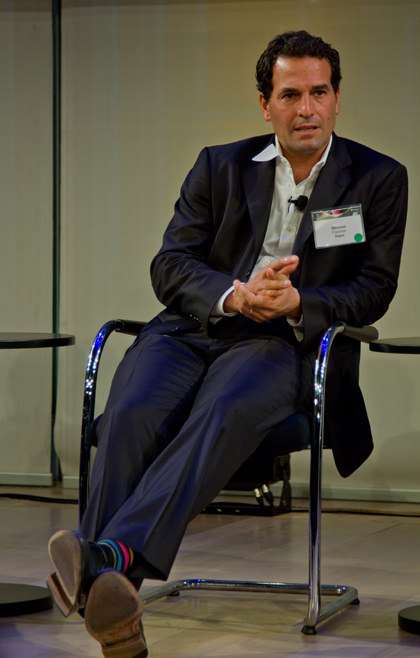Bitcoin Is a 'Fatherless' Technology. Great Attribute or Fatal Weakness?
Can Bitcoin grow and evolve without a founding figure?

One of Bitcoin's greatest attributes is that it's "fatherless," tech entrepreneur Wences Casares told EconTalk's Russ Roberts in a recent interview. Casares wasn't talking about the virtues of decentralization; plenty of decentralized technologies aren't fatherless. The father of Ethereum, for example, is Vitalik Buterin, who came up with the idea and serves as the Ethereum Foundation's chief scientist. Buterin doesn't control Ethereum because it's thoroughly decentralized, but he's the most influential figure in the community.
Bitcoin has no equivalent person, which is one reason it amassed such a large and devoted following over a short period. Here's how Casares put it to Russ Roberts:
[For example,] Wikileaks would have been more powerful, if it didn't have a father, because a lot of people associate Wikileaks with Julian Assange and some people may not like his hair and therefore they won't trust it…[I]t's like I'm trusting that person. It's a lot more powerful to have something that is fatherless.
Bitcoin is fatherless only because nobody knows the true identity of its father. After its pseudonymous creator, "Satoshi Nakamoto," faded from cyberspace in 2010, Bitcoin thrived thanks to a variety of influential figures with different visions of the technology.
Radical libertarians, drawn to Bitcoin because of its potential to undermine government power, were instrumental in keeping Bitcoin alive in its early years. The Argentinian-born Casares, who sees Bitcoin as a revolutionary tool for improving banking and finance, is perhaps Bitcoin's most influential evangelist, but he's explicitly not in this camp. "Undermining governments is not what attracts me to Bitcoin," he told Reason TV's Zach Weissmueller in a recent interview. The libertarians, cypherpunks, bankers, and Silicon Valley types can share claim to Bitcoin because there's no father figure to brand the technology.
Being fatherless is also a major liability.
Right around the time of Casares' appearance on EconTalk in July, a technical debate over Bitcoin's future was growing increasingly rancorous. If only a father figure could step in and help settle the matter.
The issue is that Bitcoin currently doesn't have enough built-in memory to keep growing for much longer. There are plenty of potential solutions, but Bitcoins core developers are bitterly divided over which is best. A worst-case scenario: Next year a new draft of the protocol will be adopted by some Bitcoin miners but rejected by others, causing a dispute over which is the real Bitcoin blockchain and whose coins hold value and whose don't. Since bitcoins are computer code with no intrinsic worth, their value is based entirely on consensus. If the community divides, it could bring Bitcoin crashing down.
If Satoshi Nakamoto were still around, he could get behind one of the many technical solutions to the scaling problem. Even if that didn't completely settle the matter and a split did occur, his imprimatur would help rally the community around one blockchain or another.
So is being 'fatherless' a great attribut or a fatal flaw?
For more on that question, watch Zach Weissmueller's recent interview with Casares:


Show Comments (89)